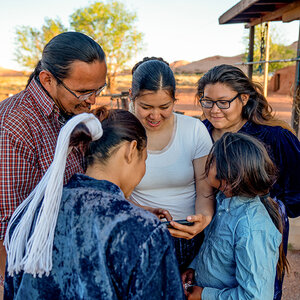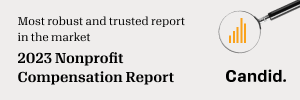Carla F. Fredericks, CEO, Christensen Fund: Ensuring Indigenous Peoples’ rights, dignity, and sovereignty
February 22, 2022
Founded in 1957, the San Francisco-based Christensen Fund works to support Indigenous peoples in advancing their inherent rights, dignity, and self-determination. In 2020 the foundation implemented a new grantmaking strategy that centers its work on “supporting and strengthening Indigenous peoples’ efforts to secure and exercise their rights to their land, territories, resources, and sovereign systems of governance.” The shift from a regional approach to a rights-based one in support of the global Indigenous Peoples’ Movement is rooted in the UN Declaration on the Rights of Indigenous Peoples.
Carla F. Fredericks joined the foundation as CEO in January 2021. An enrolled citizen of the Mandan, Hidatsa, and Arikara Nation of North Dakota, Fredericks is an expert in sustainable economic development, finance, human rights, Indigenous peoples law, and federal Indian law. She has provided core support to the United Nations Special Rapporteur on Rights of Indigenous Peoples, serving as counsel to the Standing Rock Sioux Tribe in bringing their opposition to the Dakota Access Pipeline to international financial institutions, assisting the Maya peoples of Southern Belize in implementing the affirmation of their land rights, and developing a model for Indigenous-driven consent processes and remedy. As a faculty member of the University of Colorado Law School, in 2017 she relaunched First Peoples Worldwide—an interdisciplinary program that engages investors, companies, financial institutions, and policy makers with Indigenous peoples to promote implementation of Indigenous rights. Fredericks also serves as board chair of the Mashantucket Pequot (Western) Endowment Trust, and is a member of the Indigenous Peoples Advisory Group to the Decolonizing Wealth Project.
PND asked Fredericks about the foundation’s right-based grantmaking strategy, the intersection of Indigenous people’s rights and climate action, and her work to integrate human rights into financial frameworks.
Philanthropy News Digest: You joined the Christensen Fund just as it shifted from a regional grantmaking strategy to a rights-based one. What does a rights-based approach look like, in concrete terms?
Carla F. Fredericks: Taking a rights-based approach means that we support and defend Indigenous Peoples inherent human rights, in and of themselves. Indigenous Peoples are too often seen as a means to an end to carry out solutions ordained by non-native people in power—especially in environmental and climate spaces. But Indigenous Peoples’ rights and sovereignty need to be restored and defended because these communities are inherently worthy of the same rights and protections that all people deserve.
Our approach centers Indigenous Peoples as rights holders first and foremost. It is rooted in the UN Declaration on the Rights of Indigenous Peoples (UNDRIP), which is the global standard that both asserts and recognizes Indigenous worldviews and values and establishes a universal framework for recognition of their rights. UNDRIP is the most comprehensive international instrument on the rights of Indigenous Peoples.
Part of the goal of growing the recognition and use of UNDRIP by both Indigenous Peoples and states is to move Indigenous Peoples’ rights toward the status of customary, international, and/or domestic law. Our ultimate goal as a foundation is always to improve Indigenous Peoples’ lived realities in every way. This includes ensuring that Indigenous communities know their rights and protections under UNDRIP, and supporting them in defending these rights and protections. Rooting our strategy in UNDRIP is our contribution to the essential global work of ensuring that nation-states recognize and adhere to Indigenous Peoples’ rights, dignity, and sovereignty in order to improve their daily lives beyond just considering the well-being of the land and seascapes they steward.
In concrete terms, this looks like practicing trust-based grantmaking that advances self-determination and is not prescriptive. We’ve moved all of our grantmaking to general operating, multiyear support and have thrown significant financial support behind Indigenous-led funding mechanisms that fund Indigenous communities.
PND: The Christensen Fund was one of seventeen funders that committed to investing $1.7 billion to help Indigenous and local communities protect the biodiverse tropical forests at the United Nations Climate Change Conference (COP26) last November. Can you share a little about the foundation’s commitment?
CFF: It was important for us to join this pledge to ensure that the commitment to fund Indigenous communities directly is honored. We also wanted to ensure that Indigenous communities have a defined role in decision-making and the design of climate programs and finance instruments as part of the pledge. There’s a lot of understandable mistrust of environmental philanthropy among Indigenous communities, and we want to play a role in rebuilding that trust.
Per the pledge, specific commitment amounts are not public, but we will be sharing more details as to how we’re investing our share on an ongoing basis. We believe this type of pooled funding represents a real opportunity to center Indigenous rights and leadership. It can help more funders understand that taking a rights-based approach to philanthropy is the best way to be in right relationship with the people and organizations we support, and to truly live our stated values.
PND: Why is it important for funders to focus on Indigenous and local communities in supporting climate action?
CFF: Indigenous Peoples manage or hold tenure over 25 percent of the world’s land surface and support about 80 percent of the remaining global biodiversity. Their unique relationship with lands and natural systems have supported them and their ancestors for millennia. They are undeniably the best stewards of these natural landscapes and mitigating the symptoms of climate change.
Unless we prioritize the dignity, sovereignty, and self-determination of Indigenous Peoples on a global scale, we will be replicating the colonized, industrialized thinking that has led us to the climate mess we’re currently in.
Today, more people with power and wealth understand the vital role that Indigenous Peoples play in defending and protecting the world’s biodiversity and managing climate change. Funding for initiatives led by Indigenous Peoples is increasing, which is a great thing. But unless we prioritize the dignity, sovereignty, and self-determination of Indigenous Peoples on a global scale, we will be replicating the colonized, industrialized thinking that has led us to the climate mess we’re currently in.
PND: You’ve long advocated for the integration of human rights into the capital markets and worked to improve environmental and social risk management frameworks. How did you come to focus your work on financial systems and institutions?
CFF: The U.S. Supreme Court’s decision in Citizens United really put a fine point on this for me. Once they ruled that corporations have the right to unfettered advocacy in government, it became really clear that engaging directly with the corporations before governmental decision making happened was going to be critical in protecting the rights of all people. Corporations have a different type of power than individuals. And, because in the U.S., monetary power influences our election process directly, these corporations need to understand their obligations to human rights differently. They are vested with a level of influence not unlike that of state actors. Politicians and regulatory processes and legislation are in some ways more transient than the existence of companies. A lot of companies outlast political actors and the impact they will have on our society will be longer lasting than that of political actors, especially on the environment.
I was also seeing this play out on my own reservation, where oil and gas development directly impacted people’s daily lives. I believed if people understood better how to engage with business interests that there would be better outcomes for the community.
PND: You helped the Standing Rock Sioux Tribe bring their opposition to the Dakota Access Pipeline to international financial institutions. Are financial institutions beginning to pay more attention to climate change, environmental justice, and human rights? Or, as BlackRock CEO Larry Fink recently wrote, is it merely that “[companies] focus on sustainability not because we’re environmentalists, but because we are capitalists and fiduciaries to our clients”?
CFF: I co-authored the First Peoples Worldwide study on the financial implications of Standing Rock. I was watching Energy Transfer Partners’ share price experience extreme volatility. Something would happen at the camp, and their share price would tank. There would be a decision in their favor, and the share price would go up. There would be a legal decision in favor of the tribe, and the price would go down. I wondered if pipeline investors had known what they were getting into. I wondered if the banks that were part of that master limited partnership really appreciated that they were going to experience this volatility. And of course they could not have, because it wasn’t disclosed to them. The whole financial system relies upon disclosure to make decisions. Without that disclosure, investors are not as aware of their risks as they need to be.
Now investors are recognizing that sustainability needs to be part of disclosure so we don’t take on unknown risks. It’s about weaving sustainability into understanding of financial risk.
This isn’t new—investors have known this since the SEC disclosure rules came out of the 1928 stock market crash. Now investors are recognizing that sustainability needs to be part of disclosure so we don’t take on unknown risks. It’s about weaving sustainability into understanding of financial risk. What BlackRock is doing is interesting, because they are admitting that sustainability is material to investment returns and decision making. For them, it’s not a moral or ethical question; it’s a financial one, which is the case I made in my recent Harvard Law Review piece on shareholder primacy. I believe, however, that we should consider moral and ethical implications—because at the end of the day to have unfettered capitalism that is not conscious of human beings is not a good recipe for a just society.
PND: As director of First Peoples Worldwide, you created a model for a private equity fund that supports sustainable resource development and entrepreneurship in Indian Country. Can you explain, briefly, how it works?
CFF: The real lever for the private equity fund is making sure ownership remains with the tribe as the owner of the resources. It means investing alongside the tribes and ensuring that the tribes have continued ownership as a means to exercise self-determination and decision making in energy projects on their land. In the extractive context (mining, oil and gas), federal laws were written so that the tribes are passive landlords with no decision making in most cases. But in the renewable context, we learn from what hasn’t gone well in the extractive context and do it differently. So, the laws were written differently to give the tribes more agency and ownership from the outset. The private equity fund model captured that difference and envisioned equity for investors as well as the tribe as the resource holder.
PND: In 2020, you led efforts to organize racial justice, environmental, and religious organizations and investors representing $630 billion in assets under management to have the Washington, D.C. football team’s name changed. We’ve also seen Confederate flags and monuments come down and schools renamed. Do you see sustainable momentum building for racial justice movements broadly?
CFF: The way the Washington football team handled its rebranding really reflects that they understand the future from an economic and cultural perspective. Racist mascots are the past, not the future. My hope is that other teams will follow suit. There’s an interesting confluence going on between culture, morality, and economic concerns that perhaps will lead to a more sustainable racial justice future. If you study the history of this country, there’s been progress, but it’s been a continuous struggle with a lot of backlash. We’re seeing that now. But companies take the long view because they have to for investors to have confidence in the long-term investment returns. The cyclical nature of culture is countered by the long-term view that investors will have. I am hopeful that the economic piece will be a driver for continuous progress.
PND: While the ranks of foundation executives are gradually becoming more diverse, Native Americans remain severely underrepresented, not only at the top but across the philanthropic sector. Why do think that is, and what can the sector do to address the issue?
CFF: Indigenous leadership is an opportunity that’s unexplored and offers a lot of potential to philanthropy, corporations, and the broader world. It’s pitiful how few Native people are in leadership positions in the private sector—in philanthropy, corporate boards and in the c-suite. Meanwhile, what you see across Indian Country is formidable, long-term, incredibly visionary leadership across Native organizations and tribes for decades now. These leaders have actualized incredible success for their communities, which can definitely translate to leadership across society.
What you see across Indian Country is formidable, long-term, incredibly visionary leadership across Native organizations and tribes for decades now. These leaders have actualized incredible success for their communities, which can definitely translate to leadership across society.
Moreover, you see a lot more organizations adopting governance models based on how Indigenous communities organize themselves, such as holacracies, a system of corporate governance whereby members of a team or business form distinct, autonomous, yet symbiotic, teams to accomplish tasks and company goals; and sociocracies, a form of government in which society as a whole has sovereign rights. Some of the practices that are being adopted by big companies like Zappos and Microsoft are rooted in how Indigenous Peoples have always approached organization and leadership. We have a lot to share with the broader world—not only how to live in harmony with each other and the planet we all share, but also how to productively share power within an organization.
Native people have been overlooked throughout society and marginalized, and we need to think differently. It is short sighted and limited to think that Indigenous Peoples only have expertise in Indigenous issues and topics. Philanthropy can take a leading start by broadening the aperture it applies when thinking about the expertise Indigenous People can offer. We have a very strong, high capacity group of folks that have a lot to offer and that’s only growing.
Supporting Indigenous leadership is a priority for the Christensen Fund, and we will be announcing a leadership program for Indigenous leaders advancing the inherent rights, dignity, and self-determination of their communities, Nations and Peoples in the coming months, so stay tuned for that.
—Kyoko Uchida







